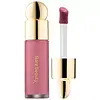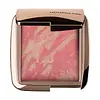What's inside
What's inside
 Key Ingredients
Key Ingredients

No key ingredients
 Benefits
Benefits

No benefits
 Concerns
Concerns

 Ingredients Side-by-side
Ingredients Side-by-side

Hydrogenated Polyisobutene
EmollientHydrogenated Poly(C6-14 Olefin)
EmollientMica
Cosmetic ColorantOctyldodecanol
EmollientEthylene/Propylene/Styrene Copolymer
Trimethylsiloxysilicate
EmollientIsododecane
Emollient1,2-Hexanediol
Skin ConditioningDisteardimonium Hectorite
StabilisingSorbitan Sesquioleate
EmulsifyingPropylene Carbonate
SolventTriethoxycaprylylsilane
Aluminum Hydroxide
EmollientHelianthus Annuus Seed Oil
EmollientGardenia Florida Fruit Extract
Skin ConditioningNelumbo Nucifera Flower Extract
Skin ConditioningNymphaea Odorata Root Extract
RefreshingCI 77491
Cosmetic ColorantCI 15850
Cosmetic ColorantCI 15985
Cosmetic ColorantCI 77891
Cosmetic ColorantCI 19140
Cosmetic ColorantCI 45410
Cosmetic ColorantHydrogenated Polyisobutene, Hydrogenated Poly(C6-14 Olefin), Mica, Octyldodecanol, Ethylene/Propylene/Styrene Copolymer, Trimethylsiloxysilicate, Isododecane, 1,2-Hexanediol, Disteardimonium Hectorite, Sorbitan Sesquioleate, Propylene Carbonate, Triethoxycaprylylsilane, Aluminum Hydroxide, Helianthus Annuus Seed Oil, Gardenia Florida Fruit Extract, Nelumbo Nucifera Flower Extract, Nymphaea Odorata Root Extract, CI 77491, CI 15850, CI 15985, CI 77891, CI 19140, CI 45410
Mica
Cosmetic ColorantSynthetic Fluorphlogopite
Boron Nitride
AbsorbentHdi/Trimethylol Hexyllactone Crosspolymer
Polymethyl Methacrylate
Octyldodecanol
EmollientBenzoic Acid
MaskingC13-14 Isoparaffin
EmollientDehydroacetic Acid
PreservativeDiamond Powder
AbrasiveDimethicone
EmollientEthylhexylglycerin
Skin ConditioningLaureth-7
EmulsifyingMagnesium Aluminum Silicate
AbsorbentPhenoxyethanol
PreservativePolyacrylamide
Polymethylsilsesquioxane
Potassium Sorbate
PreservativeSilica
AbrasiveSodium Dehydroacetate
PreservativeSorbic Acid
PreservativeSorbitan Sesquioleate
EmulsifyingTin Oxide
AbrasiveTrimethylsiloxysilicate
EmollientCI 15850
Cosmetic ColorantCI 16035
Cosmetic ColorantCI 75470
Cosmetic ColorantCI 77007
Cosmetic ColorantCI 77163
Cosmetic ColorantIron Oxides
CI 77891
Cosmetic ColorantMica, Synthetic Fluorphlogopite, Boron Nitride, Hdi/Trimethylol Hexyllactone Crosspolymer, Polymethyl Methacrylate, Octyldodecanol, Benzoic Acid, C13-14 Isoparaffin, Dehydroacetic Acid, Diamond Powder, Dimethicone, Ethylhexylglycerin, Laureth-7, Magnesium Aluminum Silicate, Phenoxyethanol, Polyacrylamide, Polymethylsilsesquioxane, Potassium Sorbate, Silica, Sodium Dehydroacetate, Sorbic Acid, Sorbitan Sesquioleate, Tin Oxide, Trimethylsiloxysilicate, CI 15850, CI 16035, CI 75470, CI 77007, CI 77163, Iron Oxides, CI 77891
 Reviews
Reviews

Ingredients Explained
These ingredients are found in both products.
Ingredients higher up in an ingredient list are typically present in a larger amount.
Ci 15850 is the pigment color red. It is an azo dye and created synthetically.
Azo dyes need to be thoroughly purified before use. This allows them to be more stable and longer-lasting.
This ingredient is common in foundations, lipsticks, and blushes. This color is described as brown/orangey red.
It has many secondary names such as Red 6 and Red 7. According to a manufacturer, Red 6 usually contains aluminum.
Learn more about CI 15850Ci 77891 is a white pigment from Titanium dioxide. It is naturally found in minerals such as rutile and ilmenite.
It's main function is to add a white color to cosmetics. It can also be mixed with other colors to create different shades.
Ci 77891 is commonly found in sunscreens due to its ability to block UV rays.
Learn more about CI 77891Mica is a naturally occurring mineral used to add shimmer and color in cosmetics. It can also help improve the texture of a product or give it an opaque, white/silver color.
Serecite is the name for very fine but ragged grains of mica.
This ingredient is often coated with metal oxides like titanium dioxide. Trace amounts of heavy metals may be found in mica, but these metals are not harmful in our personal products.
Mica has been used since prehistoric times throughout the world. Ancient Egyptian, Indian, Greek, Roman, Aztec, and Chinese civilizations have used mica.
Learn more about MicaOctyldodecanol is a fatty alcohol. It is primarily used to enhance the texture of products.
As an emulsifier, Octyldodecanol helps prevent the oils and waters from separating. It also prevents ingredients from creating foam when shaken.
Octyldodecanol is created by reducing fatty acid to an alcohol.
Due to its high molecular weight, it does not get absorbed into the skin.
Learn more about OctyldodecanolSorbitan Sesquioleate is derived from sorbitol and oleic acid. It is an emulsifier and prevents ingredients from separating.
Specifically, this ingredient is a water-in-oil emulsifier, meaning it helps water dissolve into oil.
Some studies suggest this ingredient may cause irritation in some people. If you are unsure, it is best to patch test.
This ingredient may not be Malassezia folliculitis, or fungal-acne safe.
Learn more about Sorbitan SesquioleateThis silicone is an emollient. Emollients create a thin film on the skin to prevent moisture from escaping.
It is not soluble in water and helps increase water-resistance in products.
According to a manufacturer, it can blend seamlessly with silicone oils, such as Cyclopentasiloxane.
Learn more about Trimethylsiloxysilicate